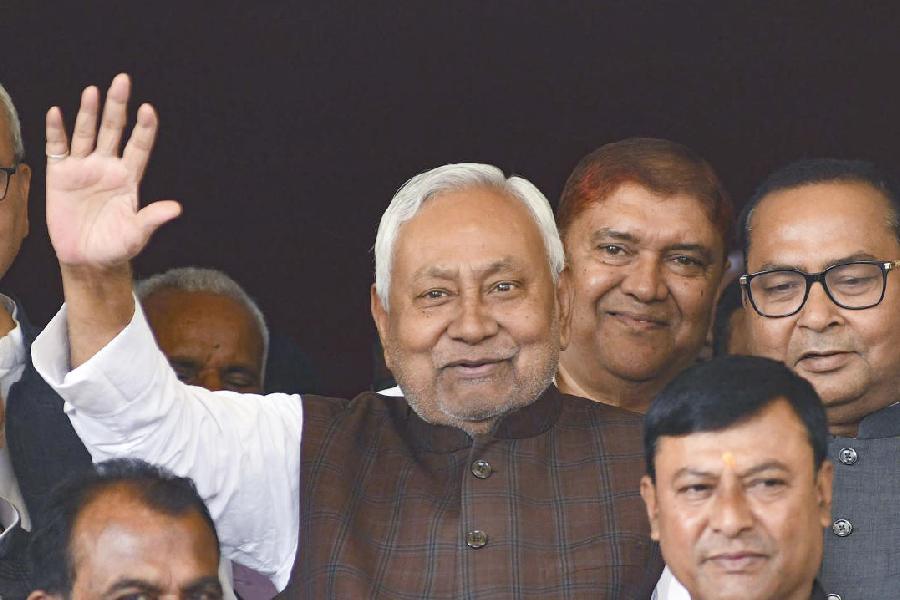Lost wonder
Sir — Somewhere over the rainbow, climate change is lurking. A recent study warns that parts of India may lose rainbows because of shifting rainfall and cloud cover. The loss of rainbows may not be along the lines of other climatic changes being wrought by global warming but it will certainly lead to the loss of a sense of wonder. It is one of nature’s most democratic spectacles. Anyone can look up and claim it — children chase it, poets immortalise it, and even the grumpiest person usually pauses for a glance. That thought alone should be reason enough to take this crisis more seriously.
T.S. Karthik,
Chennai
Target practice
Sir — The chief minister of Assam, Himanta Biswa Sarma, has announced that except for scheduled castes, scheduled tribes and tea garden workers, the government will stop issuing Aadhaar cards to adults in the state. On the surface, this appears to address a longstanding anxiety about migration. However, selective denial of identity documents risks pushing legitimate citizens into statelessness. This does not solve the issue of illegal migration, which requires effective cooperation between India and Bangladesh, along with investment in border management and transparent verification to be tackled. Without these, broad measures will penalise the vulnerable while failing to deal with unlawful entry.
Md. Sabir Hussain,
Mumbai
Sir — Migration in Assam has been politically contested for decades. Leaders argue that unchecked entry alters demography and threatens culture. This fear resonates with many, and dismissing it outright ignores legitimate concerns. At the same time,
the rhetoric of infiltrators fuels hostility toward citizens who share language or faith with Bangladeshis. The challenge is to distinguish between unauthorised migration and lawful residency. A balanced approach can preserve cultural identity without undermining constitutional equality.
Paresh Kanungo,
Dibrugarh
Sir — Easing arms licences for so-called indigenous Assamese is being defended as a means of ensuring protection in vulnerable regions. This logic is deeply flawed. Security is the responsibility of the State, not of civilians. Arming one community creates the impression that others are inherently suspect.
Arun Kumar Baksi,
Calcutta
Unfair picture
Sir — The trailer of The Bengal Files claims to unearth a suppressed account of a Hindu genocide during the 1946 Calcutta riots. The trailer’s tone remains heavy with sensationalism that leaves room for doubt because the narrative has not been vetted by historians. Sensitive themes need more than bold assertions. Ethical storytelling must balance factual accuracy with emotional impact. Respect for history should not be sacrificed at the altar of cinematic appeal.
Ajay Tyagi,
Mumbai
Sir — The debate around The Bengal Files shows the thin line between raising awareness and stoking division. Cinema that revisits historical violence should embrace complexity rather than cast collective blame. It should invite critical discussion rather than close it. The goal should be to heal by illuminating, not to rekindle wounds. Viewers ought to be encouraged to question, research and reflect. Films that foster such inquiry build bridges between past and present.
Shatadru Ghosh,
Calcutta
Test of equality
Sir — The suggestion of a two-tier World Test Championship is meant to make cricket more competitive and commercially attractive. Supporters believe frequent contests between top nations will revive spectator interest. Critics warn that smaller teams will be marginalised. A split risks deepening the gulf between elite boards and weaker nations. Test cricket requires reform but it must remain inclusive. A healthy structure needs competition and opportunity in equal measure, otherwise the game risks shrinking to a privileged few while others fade into irrelevance.
Anupam Neogi,
Calcutta
Sir — Test cricket has a devoted but limited audience. The two-tier model could sharpen rivalries and offer consistent, high-quality contests. Broadcasters and sponsors would welcome the product. Yet excitement at the top cannot justify exclusion at the bottom. Fans in emerging markets deserve to see their teams play Tests regularly. Cricket must avoid a caste system where the rich thrive and the rest barely survive. The future health of the game lies in broadening its base, not trimming it for short-term ratings.
Annesha Ghosh,
Calcutta
Special taste
Sir — Mangoes hold a special place in India; they are linked to family traditions, folklore, and even survival stories. They are more than fruit for many households. At the same time, commercial farming and climate change threaten both quality and availability. The challenge is to preserve varieties without turning mangoes into a luxury item for only the wealthy.
Zakir Hussain,
Kazipet, Telangana










